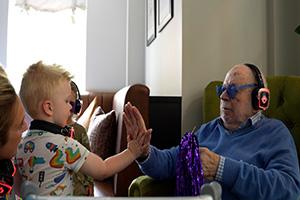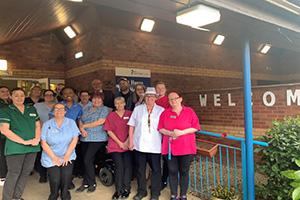Tackling stress, burnout and absenteeism in the care sector
Working days lost rose from 2.7% pre-Covid to 7.5% post Covid* placing significant additional burden on care teams, a statistic which will be further impacted by the compulsory vaccination regulations and current staff shortages.
Even prior to the pandemic, working long hours for typically low pay, challenges in managing the behaviour of residents, and the relentless pressure to carry on regardless, were all factors in rising stress levels among care home staff. The far-reaching consequences including high staff turnover, absenteeism, staff malpractice, and poor mental health all point to the need for cultural change across the care home sector.
As stress management and staff wellbeing become an overriding priority across healthcare and care sectors in tackling work-related issues, Tidal Training has launched a new course for Post Critical Incident Stress Debrief Facilitator (CISD) training, the leading course of its kind in the UK. It is having success in NHS, medical and care environments reducing burnout and absenteeism and improving team cohesion in acute stress situations. Many are now adopting it as part of their mental health framework and creating psychological first aid teams.

What is Post Critical Incident Stress Debriefing (CISD)?
Following the Mitchell model, CISD is a supportive crisis intervention process, designed to support groups or teams, directly following an acute stress incident. It is not a replacement for, or delivery of psychotherapy, but aims at a reduction of distress and restoration of group cohesion at a time of acute stress.
When can it be applied?
The term ‘critical incident’ refers to a traumatic or crisis event that usually impacts a group of people. Critical Incident Stress Debrief Training can be particularly beneficial in a workplace or community setting, in preparation for a potential incident that causes acute stress. It can apply to any size or scale of event, for example:
- loss of a resident or client following a long-term period of care
- the sudden death of a colleague, partner or person in the community
- a workplace accident of any scale
- a large-scale traumatic event directly affecting a region, team, and/or community; examples include Covid-19, the Grenfell Tower fire or the Manchester bombings.
The size and scale of the event can be immaterial; it is the trauma, acute stress, and psychological distress that CISD seeks to help alleviate and resolve.
* stats from Skills for Care Workforce Intelligence
CISD in action: Royal Brompton and Harefield NHS Foundation Trust
Jon Head, Deputy Director of HR/Site HR Lead for Harefield Hospital at Royal Brompton & Harefield NHS Foundation Trust, explains why Tidal Training’s Post Critical Incident Stress Debrief Facilitator training became pivotal in supporting his staff’s mental health and wellbeing during 2020.
COVID-19 has shown that prioritising NHS staff wellbeing to deliver safe and high-quality patient care, while ensuring people are safe and healthy at work, has never been more crucial. Yet traumatic events, covering a wide area from major incidents to patient deaths and inquests, are experienced by staff throughout their professional lives and can cause acute stress.
Stress among NHS staff rose last year as the pandemic took its toll, with results from the 2020 NHS annual survey revealing that 44 per cent of staff reported feeling unwell from work-related anxiety, the highest rate recorded in the past five years.
Jon credits the training with supporting his teams through an unprecedented period, helping to prevent them becoming overwhelmed in periods of acute stress, and ensuring the team kept functional. Last year alone, over 30 debrief sessions were attended by 300 staff across both sites, all dealing with general pressure.
“We held the first of three training sessions at the beginning of 2020, as part of the Trust’s Care for the Carers strategy. Our objective was to train a number of employees to create a Psychological First Aid (PFA) team, to assist people in the immediate aftermath of specific incidents which had occurred for example during surgery or in cath labs. Our aim was not to learn clinical lessons, but to support staff experiencing pressure from delivering treatment. The basic principle of PFA is that, in the immediate aftermath of the traumatic event, support from a trained compassionate individual may aid in long-term recovery. The need for having this framework in place was evident prior to COVID, when PTSD levels were noted as being 'high' in some clinical areas. It is a real privilege to have a team of this calibre providing such a comprehensive psychology service.”
He continues: “But then in March the pandemic struck and we found we could utilise this training effectively, albeit under a completely new, unexpected set of circumstances. Staff wellbeing has always been paramount, but given the pandemic, it was our priority to ensure sure that our people have access to our own experts on-site. This saw the mobilisation of PFA teams to support clinical and non-clinical staff involved in all aspects of care, from therapists and porters to pharmacists and medical teams, across both of our Royal Brompton and Harefield sites. We rolled this out over the next 6-9 months as part of the Staff Psychology Service which we now have permanently in place, a multidisciplinary, high-calibre team of professionals made up of psychologists, counsellors and the PFA Team. It has been able to offer support to individuals and teams during both the first and second wave.
“While cumulative stress has played a major role during the pandemic, such as overwork and long shifts, there have nonetheless been periods of acute stress, for instance, losing a patient or not having enough beds, where the training has played a vital role in identifying those red flags and making sure those who needed it had access to the right support. We also found it immeasurably useful for matrons working in ITU and one particular incident concerning a traumatic cath lab death.
Having an internal service has tremendous benefits – the training has ensured we have specific resources in place to support our staff with their mental and emotional wellbeing, in what has been an extremely challenging time.”





